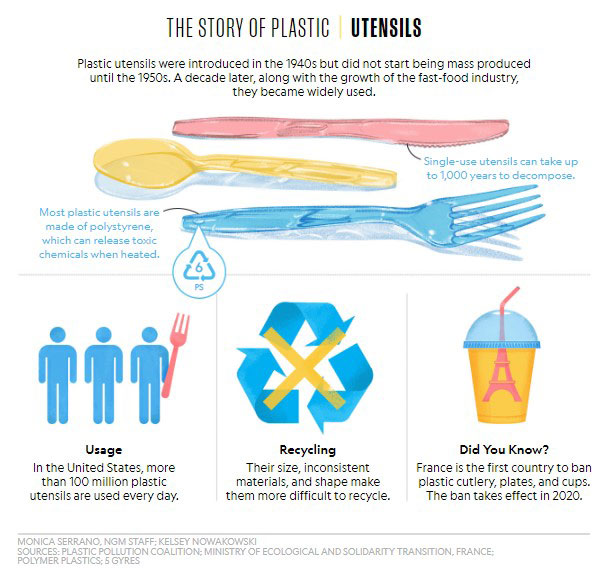
Climate change and plastic pollution are catastrophic problems that seem overwhelming. Can ordinary people actually do anything to make a significant impact? Yes! There are simple sustainable swaps that really make a difference in our environmental and future well-being.
Our Down to Earth Organic & Natural stores are focusing on sustainability, especially this November, to provide information and inspiration—all of us can make a difference with easy shifts in our daily lives. Join us in making real change and a real positive impact, one simple sustainable swap at a time:
- Eat a plant-based vegetarian diet. Since 1977, Down to Earth has been talking about the environmental and health benefits of "going veggie". Eating a vegetarian diet is one of the most significant factors to reduce our individual negative impact on the earth and climate.
- Bring your own utensils when eating out. Plastic cutlery is a $2.6 billion business because of a proliferation of our modern “disposable culture”. But convenience has come at a cost. Like many plastic items, utensils often find their way into the environment. According to beach-cleanup data compiled by the non-profit 5Gyres, utensils are the seventh most commonly collected plastic item1. An easy solution that just takes some mental adjustment is to simply bring your own reusable silverware when you are away from home and refuse to use plastic utensils.
Our Down to Earth stores are introducing two new utensil choices in our stores- Foodstiks Birchware is fully compostable in your yard in 90 days and leaves no residue. The wood is FSC certified wood and has no chemicals in it. One piece of wood the size of a telephone poll can make 20,000 utensils. On November 1st we are sampling edible spoons in all of our stores from 11:30-12:30pm. Yes, you read that right—EDIBLE. SPOONS. They come in two flavors, plain and chocolate, and are non-GMO. If you haven’t eaten your spoon after your meal, you’ve got to come and try it!![The History of Plastic Utensils]()
- Skip the straws, or switch to an alternative straw. Please read Sisi Kong’s blog entry below on the problem with plastic straws and the many alternatives that are available. Down to Earth is phasing out plastic straws at all our locations and we are excited to be hosting Hawaii Eco Straws in our stores. Stop by and pick up a Hawaii Eco Straw (offered for free, with an option to make a donation to their efforts) or consider making a new habit of skipping the straw!
- Bring your own produce bags. The Zero-Waste Chef has a great explanation of why we should all be using reusable bags for our produce, plus they have an easy tutorial on how to make your own.
Why Shop with Reusable Produce Bags?
Since the 1950s, approximately 8.3 billion tons of plastic have been produced worldwide and only 9% of that has been recycled.
Every minute, the equivalent of a truckload of plastic enters our oceans.
If we do not drastically reduce our plastic consumption, by 2050, the oceans will contain more plastic than fish by weight.
Because China will no longer accept our plastic waste (and why should it?), by 2030, the world will need to bury or recycle an estimated 111 million metric tons of the stuff.
Micro-plastics are in our water, our air, our fish and even human stool. - Reduce food waste. The U.S. wastes up to 40% of its food supply each year, according to the U.S. Department of Agriculture. A report from the sustainability-focused World Resources Institute says food waste is responsible for 8% of annual greenhouse gas emissions, and that 25% of agricultural water use and a land mass the size of China go toward producing food that ultimately is uneaten.1 Please read Sabra Leomo’s Health Tip below for ideas on how to reduce food waste during the holidays, and every day.
Our Down to Earth stores donate day-old deli foods instead of throwing it out to Aloha Harvest. Founded in 1999, Aloha Harvest is the sole food rescue organization in the state. Their mission is to “rescue and deliver quality, excess food to help feed the needy, hungry, and homeless in Hawai‘i”. Aloha Harvest picks up excess foods from our Oahu locations several times a week to share with local charities. Our produce waste at several of our stores is also donated to local animal sanctuaries and to farmers for compost.
For some helpful information on how to reduce your rubbish footprint, add this upcoming talk to your calendar: Take Action to Reduce Waste, a free talk by Zero Waste Hui in Honolulu or Kailua. This talk will be a deep dive into ways we can change the systems and habits that keep us in a waste mindset. Leave with clear and tangible next steps to:
- Reduce waste in your household/business.
- Support and demand changes in our production systems and consumer economy.
- Ways you can get involved in your community to help reduce waste.
Visit any of our Down to Earth stores during the month of November to see the green initiatives we are adopting. There are a lot more steps we want to take but we are dedicated to the journey toward a more sustainable future. Please join us!
Sustainability Events in November
See what Down to Earth is doing to be more sustainable at: www.downtoearth.org/sustainability
1 Ducharme, Jamie. Time (website) “Food Waste Is a Huge Environmental Problem. Here Are 5 Ways to Reduce Yours”, September 3, 2019.
2 Root, Tik. National Geographic (website),“Why carrying your own fork and spoon helps solve the plastic crisis”, June 28, 2019.
